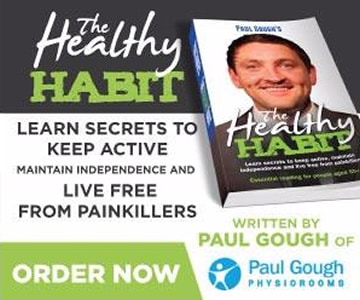Are you currently suffering with, or have you suffered with shoulder pain before?…
It’s one of the greatest mysteries of being 50+ – the sudden onset of shoulder pain and stiffness that often creeps up on people with no warning and usually offers NO explanation.
Sometimes it just happens. I’ve had a number of patients come to see me and say things like…
“I just woke up one morning a month ago with a pain in my neck and shoulders, I thought it’d go away but it’s starting to get on my nerves now!”
And
“At first my shoulder just felt stiff when I woke up, I didn’t think much of it at first, like with any other aches and pains they usually ease off after a few days, but my shoulder has become tighter and it’s interfering with my day. I can’t even reach for my coffee cup in the cupboard without it feeling painful.”
And because it can just happen without warning, people usually “try” a number of options before coming to see me, when looking for ways to end shoulder pain…
===
1. Painkillers
2. Rest and time
3. “Nice” relaxing spa style massages
Do any of these ’solutions’ sound familiar?
Here’s why none of them ever work in the long run, like people who are trying them out, hope:
1. Painkillers
The thing with painkillers is that they might ease the pain for an hour or so, but all that paracetamol and anti-inflammatory tablets do is MASK the pain – they don’t get to the root cause of your ache and pain.
When painkillers wear off and you go to grab another two, the problem is still there and you’re still left feeling frustrated with a very tight muscle, or a stiff shoulder.
They DON’T solve the problem.
2. Rest and time
It’s a common thing to think that resting your shoulder will fix the pain, but the thing is, with time and MORE rest, your muscles become tighter and your joints become stiffer.
Just like if you leave your car sitting on the driveway for a few months, when you get back in to drive it again, it’s unlikely that it’ll feel smooth straight away.
Your joints and muscles are designed to move, and your body gets stronger the more you keep it active.
And that’s why it’s crucial that you get your shoulder joints moving to reduce any stiffness, to help it feel more relaxed so you can freely begin to move without pain again.
3. “Nice” relaxing, spa style massages
As lovely as these feel, these types of massages will never work.
Now it’s not the girls fault at all! Those types of massage therapists aren’t trained to get to the root cause of your problem – the pressure applied to your muscles won’t ever be ‘quite right’.
And when they tell you that they can feel ‘knots’ in your shoulders – every person over the age of 45 has knots and tension in their shoulder muscles (in fact most people do regardless of age!)… but it’s not always an issue, or even the source of your pain.
This is where we can help you.
We don’t recommend dosing up on painkillers if your pain hasn’t gone after 5 days.
We’ll give you a set of personalised exercises that will be done safely when we know you’re ready for them.
And the massages that we can do for you are done with expert hands trained to know precisely where, when and how much pressure to apply to the problem area.
We want to help you get back to being active and on the go as quickly as possible.
If you’d like to know ways to put a stop to annoying, daily, irritating shoulder pain, click here to download your free report to help you today: http://www.paulgoughphysio.com/neck-shoulder-pain



